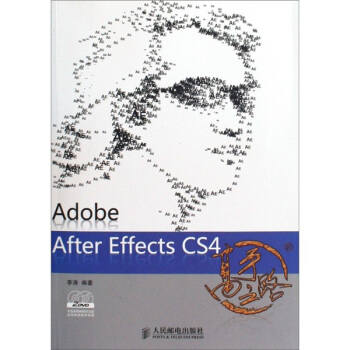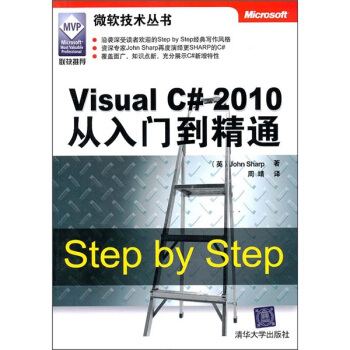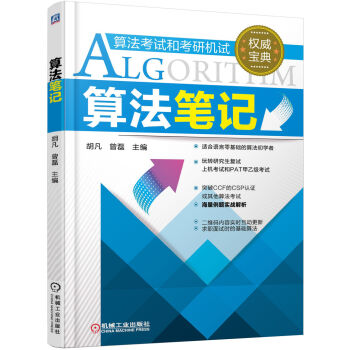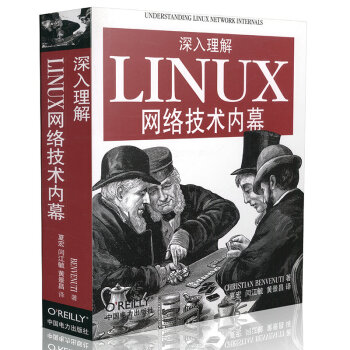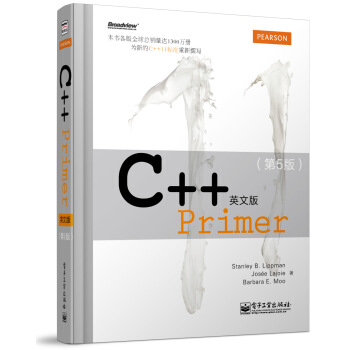

具體描述
編輯推薦
新標準C++11發布,距上一版本已10年;《C++Primer英文版(第5版)》是持續更新的全球C++讀本。
經過前四個版本積纍,第5版的體例堪稱完美。
這一版本作者曆時3年完成,極力避免在原版上升級,而是將C++11的新特性真正融入各章節;更將所有代碼示例用C++11的簡化寫法完成,而不是僅單獨增加內容。
內容簡介
《C++ Primer英文版(第5版)》久負盛名的C++經典教程,時隔八年之久,終迎來的重大升級。除令全球無數程序員從中受益,甚至為之迷醉的--C++大師Stanley B. Lippman的豐富實踐經驗,C++標準委員會原負責人Josée Lajoie對C++標準的深入理解,以及C++先驅Barbara E. Moo在C++教學方麵的真知灼見外,更是基於全新的C++11標準進行瞭全麵而徹底的內容更新。非常難能可貴的是,書中所有示例均全部采用C++11標準改寫,這在經典升級版中極其罕見--充分體現瞭C++語言的重大進展極其全麵實踐。書中豐富的教學輔助內容、醒目的知識點提示,以及精心組織的編程示範,讓《C++ Primer英文版(第5版)》這本書在C++領域的專業地位更加不可動搖。無論是初學者入門,或是中、高級程序員提升,《C++ Primer英文版(第5版)》均為不容置疑的優選。
作者簡介
Stanley B. Lippman,目前是微軟公司 Visual C++ 團隊的架構師。他從1984年開始在貝爾實驗室與C++的設計者Bjarne Stroustrup一起從事C++的設計與開發。他在迪士尼和夢工廠從事動畫製作,還擔任過JPL的高級顧問。
Josée Lajoie,曾經是IBM加拿大研究中心C/C++編譯器開發團隊的成員,在ISO C++標準委員會工作瞭7年,擔任過ISO核心語言工作組的主席和C++ Report雜誌的專欄作傢。
Barbara E. Moo,擁有25年軟件經驗的獨立谘詢顧問。在AT&T;,她與Stroustrup、Lippman一起管理過復雜的C++開發項目。
目錄
Preface xxiiiChapter 1 Getting Started
1.1 Writing a Simple C++Program
1.1.1 Compiling and Executing Our Program
1.2 AFirstLookat Input/Output
1.3 AWordaboutComments
1.4 FlowofControl
1.4.1 The whileStatement
1.4.2 The forStatement
1.4.3 ReadinganUnknownNumberof Inputs
1.4.4 The ifStatement
1.5 IntroducingClasses
1.5.1 The Sales_itemClass
1.5.2 AFirstLookatMemberFunctions
1.6 TheBookstoreProgram
ChapterSummary
DefinedTerms
Part I The Basics
Chapter 2 Variables and Basic Types
2.1 PrimitiveBuilt-inTypes
2.1.1 ArithmeticTypes
2.1.2 TypeConversions
2.1.3 Literals
2.2 Variables
2.2.1 VariableDefinitions
2.2.2 VariableDeclarations andDefinitions
2.2.3 Identifiers
2.2.4 Scopeof aName
2.3 CompoundTypes
2.3.1 References
2.3.2 Pointers
vii
viii Contents
2.3.3 UnderstandingCompoundTypeDeclarations
2.4 constQualifier
2.4.1 References to const
2.4.2 Pointers and const
2.4.3 Top-Level const
2.4.4 constexprandConstantExpressions
2.5 DealingwithTypes
2.5.1 TypeAliases
2.5.2 The autoTypeSpecifier
2.5.3 The decltypeTypeSpecifier
2.6 DefiningOurOwnDataStructures
2.6.1 Defining the Sales_dataType
2.6.2 Using the Sales_dataClass
2.6.3 Writing Our Own Header Files
ChapterSummary
DefinedTerms
Chapter 3 Strings, Vectors, and Arrays
3.1 Namespace usingDeclarations
3.2 Library stringType
3.2.1 Defining and Initializing strings
3.2.2 Operations on strings
3.2.3 Dealing with the Characters in a string
3.3 Library vectorType
3.3.1 Defining and Initializing vectors
3.3.2 Adding Elements to a vector
3.3.3 Other vectorOperations
3.4 IntroducingIterators
3.4.1 UsingIterators
3.4.2 IteratorArithmetic
3.5 Arrays
3.5.1 DefiningandInitializingBuilt-inArrays
3.5.2 AccessingtheElementsof anArray
3.5.3 Pointers andArrays
3.5.4 C-StyleCharacterStrings
3.5.5 InterfacingtoOlderCode
3.6 MultidimensionalArrays
ChapterSummary
DefinedTerms
Chapter 4 Expressions
4.1 Fundamentals
4.1.1 BasicConcepts
4.1.2 PrecedenceandAssociativity
4.1.3 OrderofEvaluation
4.2 ArithmeticOperators
4.3 Logical andRelationalOperators
Contents ix
4.4 AssignmentOperators
4.5 Increment andDecrementOperators
4.6 TheMemberAccessOperators
4.7 TheConditionalOperator
4.8 TheBitwiseOperators
4.9 The sizeofOperator
4.10 CommaOperator
4.11 TypeConversions
4.11.1 TheArithmeticConversions
4.11.2 Other ImplicitConversions
4.11.3 ExplicitConversions
4.12 OperatorPrecedenceTable
ChapterSummary
DefinedTerms
Chapter 5 Statements
5.1 Simple Statements
5.2 StatementScope
5.3 Conditional Statements
5.3.1 The ifStatement
5.3.2 The switchStatement
5.4 IterativeStatements
5.4.1 The whileStatement
5.4.2 Traditional forStatement
5.4.3 Range forStatement
5.4.4 The do whileStatement
5.5 JumpStatements
5.5.1 The breakStatement
5.5.2 The continueStatement
5.5.3 The gotoStatement
5.6 tryBlocks andExceptionHandling
5.6.1 A throwExpression
5.6.2 The tryBlock
5.6.3 StandardExceptions
ChapterSummary
DefinedTerms
Chapter 6 Functions
6.1 FunctionBasics
6.1.1 LocalObjects
6.1.2 FunctionDeclarations
6.1.3 SeparateCompilation
6.2 ArgumentPassing
6.2.1 PassingArgumentsbyValue
6.2.2 PassingArgumentsbyReference
6.2.3 constParametersandArguments
6.2.4 ArrayParameters
x Contents
6.2.5 main:HandlingCommand-LineOptions
6.2.6 FunctionswithVaryingParameters
6.3 Return Types and the returnStatement
6.3.1 FunctionswithNoReturnValue
6.3.2 FunctionsThatReturnaValue
6.3.3 ReturningaPointer toanArray
6.4 OverloadedFunctions
6.4.1 OverloadingandScope
6.5 Features forSpecializedUses
6.5.1 DefaultArguments
6.5.2 Inline and constexprFunctions
6.5.3 Aids for Debugging
6.6 FunctionMatching
6.6.1 ArgumentTypeConversions
6.7 Pointers toFunctions
ChapterSummary
DefinedTerms
Chapter 7 Classes
7.1 DefiningAbstractDataTypes
7.1.1 Designing the Sales_dataClass
7.1.2 Defining the Revised Sales_dataClass
7.1.3 DefiningNonmemberClass-RelatedFunctions
7.1.4 Constructors
7.1.5 Copy,Assignment, andDestruction
7.2 AccessControl andEncapsulation
7.2.1 Friends
7.3 AdditionalClassFeatures
7.3.1 ClassMembersRevisited
7.3.2 Functions That Return *this
7.3.3 ClassTypes
7.3.4 FriendshipRevisited
7.4 ClassScope
7.4.1 NameLookupandClassScope
7.5 ConstructorsRevisited
7.5.1 Constructor InitializerList
7.5.2 DelegatingConstructors
7.5.3 TheRoleof theDefaultConstructor
7.5.4 ImplicitClass-TypeConversions
7.5.5 AggregateClasses
7.5.6 LiteralClasses
7.6 staticClassMembers
ChapterSummary
DefinedTerms
Contents xi
Part II The C++ Library
Chapter 8 The IO Library
8.1 The IOClasses
8.1.1 NoCopyorAssignfor IOObjects
8.1.2 ConditionStates
8.1.3 ManagingtheOutputBuffer
8.2 File Input and Output
8.2.1 Using File Stream Objects
8.2.2 File Modes
8.3 stringStreams
8.3.1 Using an istringstream
8.3.2 Using ostringstreams
ChapterSummary
DefinedTerms
Chapter 9 Sequential Containers
9.1 Overviewof the SequentialContainers
9.2 ContainerLibraryOverview
9.2.1 Iterators
9.2.2 ContainerTypeMembers
9.2.3 begin and endMembers
9.2.4 DefiningandInitializingaContainer
9.2.5 Assignment and swap
9.2.6 ContainerSizeOperations
9.2.7 RelationalOperators
9.3 SequentialContainerOperations
9.3.1 AddingElements toaSequentialContainer
9.3.2 AccessingElements
9.3.3 ErasingElements
9.3.4 Specialized forward_listOperations
9.3.5 ResizingaContainer
9.3.6 ContainerOperationsMayInvalidateIterators
9.4 How a vectorGrows
9.5 Additional stringOperations
9.5.1 Other Ways to Construct strings
9.5.2 Other Ways to Change a string
9.5.3 stringSearchOperations
9.5.4 The compareFunctions
9.5.5 NumericConversions
9.6 ContainerAdaptors
ChapterSummary
DefinedTerms
xii Contents
Chapter 10 Generic Algorithms
10.1 Overview
10.2 AFirstLookat theAlgorithms
10.2.1 Read-OnlyAlgorithms
10.2.2 AlgorithmsThatWriteContainerElements
10.2.3 AlgorithmsThatReorderContainerElements
10.3 CustomizingOperations
10.3.1 PassingaFunctiontoanAlgorithm
10.3.2 LambdaExpressions
10.3.3 LambdaCapturesandReturns
10.3.4 BindingArguments
10.4 Revisiting Iterators
10.4.1 Insert Iterators
10.4.2 iostream Iterators
10.4.3 Reverse Iterators
10.5 StructureofGenericAlgorithms
10.5.1 TheFive IteratorCategories
10.5.2 AlgorithmParameterPatterns
10.5.3 AlgorithmNamingConventions
10.6 Container-SpecificAlgorithms
ChapterSummary
DefinedTerms
Chapter 11 Associative Containers
11.1 UsinganAssociativeContainer
11.2 Overviewof theAssociativeContainers
11.2.1 DefininganAssociativeContainer
11.2.2 Requirements onKeyType
11.2.3 The pairType
11.3 Operations onAssociativeContainers
11.3.1 AssociativeContainer Iterators
11.3.2 AddingElements
11.3.3 ErasingElements
11.3.4 Subscripting a map
11.3.5 AccessingElements
11.3.6 AWordTransformationMap
11.4 TheUnorderedContainers
ChapterSummary
DefinedTerms
Chapter 12 DynamicMemory
12.1 DynamicMemoryandSmartPointers
12.1.1 The shared_ptrClass
12.1.2 ManagingMemoryDirectly
12.1.3 Using shared_ptrs with new
12.1.4 SmartPointers andExceptions
12.1.5 unique_ptr
Contents xiii
12.1.6 weak_ptr
12.2 DynamicArrays
12.2.1 newandArrays
12.2.2 The allocatorClass
12.3 UsingtheLibrary:AText-QueryProgram
12.3.1 Designof theQueryProgram
12.3.2 DefiningtheQueryProgramClasses
ChapterSummary
DefinedTerms
Part III Tools for Class Authors
Chapter 13 Copy Control
13.1 Copy,Assign, andDestroy
13.1.1 TheCopyConstructor
13.1.2 TheCopy-AssignmentOperator
13.1.3 TheDestructor
13.1.4 TheRuleofThree/Five
13.1.5 Using = default
13.1.6 PreventingCopies
13.2 CopyControl andResourceManagement
13.2.1 ClassesThatActLikeValues
13.2.2 DefiningClassesThatActLikePointers
13.3 Swap
13.4 ACopy-ControlExample
13.5 ClassesThatManageDynamicMemory
13.6 MovingObjects
13.6.1 RvalueReferences
13.6.2 MoveConstructor andMoveAssignment
13.6.3 RvalueReferencesandMemberFunctions
ChapterSummary
DefinedTerms
Chapter 14 Overloaded Operations and Conversions
14.1 BasicConcepts
14.2 Input andOutputOperators
14.2.1 Overloading the Output Operator <<
14.2.2 Overloading the Input Operator >>
14.3 Arithmetic andRelationalOperators
14.3.1 EqualityOperators
14.3.2 RelationalOperators
14.4 AssignmentOperators
14.5 SubscriptOperator
14.6 Increment andDecrementOperators
14.7 MemberAccessOperators
14.8 Function-CallOperator
xiv Contents
14.8.1 LambdasAreFunctionObjects
14.8.2 Library-DefinedFunctionObjects
14.8.3 Callable Objects and function
14.9 Overloading,Conversions, andOperators
14.9.1 ConversionOperators
14.9.2 AvoidingAmbiguousConversions
14.9.3 FunctionMatchingandOverloadedOperators
ChapterSummary
DefinedTerms
Chapter 15 Object-Oriented Programming
15.1 OOP:AnOverview
15.2 DefiningBaseandDerivedClasses
15.2.1 DefiningaBaseClass
15.2.2 DefiningaDerivedClass
15.2.3 Conversions andInheritance
15.3 VirtualFunctions
15.4 AbstractBaseClasses
15.5 AccessControl andInheritance
15.6 ClassScopeunder Inheritance
15.7 Constructors andCopyControl
15.7.1 VirtualDestructors
15.7.2 SynthesizedCopyControl andInheritance
15.7.3 Derived-ClassCopy-ControlMembers
15.7.4 InheritedConstructors
15.8 Containers andInheritance
15.8.1 Writing a BasketClass
15.9 TextQueriesRevisited
15.9.1 AnObject-OrientedSolution
15.9.2 The Query_base and QueryClasses
15.9.3 TheDerivedClasses
15.9.4 The evalFunctions
ChapterSummary
DefinedTerms
Chapter 16 Templates and Generic Programming
16.1 DefiningaTemplate
16.1.1 FunctionTemplates
16.1.2 ClassTemplates
16.1.3 TemplateParameters
16.1.4 MemberTemplates
16.1.5 Controlling Instantiations
16.1.6 Efficiency and Flexibility
16.2 TemplateArgumentDeduction
16.2.1 Conversions andTemplateTypeParameters
16.2.2 Function-TemplateExplicitArguments
16.2.3 Trailing Return Types and Type Transformation
Contents xv
16.2.4 FunctionPointers andArgumentDeduction
16.2.5 TemplateArgumentDeductionandReferences
16.2.6 Understanding std::move
16.2.7 Forwarding
16.3 OverloadingandTemplates
16.4 VariadicTemplates
16.4.1 WritingaVariadicFunctionTemplate
16.4.2 PackExpansion
16.4.3 ForwardingParameterPacks
16.5 Template Specializations
ChapterSummary
DefinedTerms
Part IV Advanced Topics
Chapter 17 Specialized Library Facilities
17.1 The tupleType
17.1.1 Defining and Initializing tuples
17.1.2 Using a tuple toReturnMultipleValues
17.2 The bitsetType
17.2.1 Defining and Initializing bitsets
17.2.2 Operations on bitsets
17.3 RegularExpressions
17.3.1 UsingtheRegularExpressionLibrary
17.3.2 TheMatchandRegex IteratorTypes
17.3.3 UsingSubexpressions
17.3.4 Using regex_replace
17.4 RandomNumbers
17.4.1 Random-NumberEngines andDistribution
17.4.2 OtherKinds ofDistributions
17.5 The IOLibraryRevisited
17.5.1 FormattedInput andOutput
17.5.2 UnformattedInput/OutputOperations
17.5.3 RandomAccess toaStream
ChapterSummary
DefinedTerms
Chapter 18 Tools for Large Programs
18.1 ExceptionHandling
18.1.1 ThrowinganException
18.1.2 CatchinganException
18.1.3 Function tryBlocks andConstructors
18.1.4 The noexceptExceptionSpecification
18.1.5 ExceptionClassHierarchies
18.2 Namespaces
18.2.1 NamespaceDefinitions
xvi Contents
18.2.2 UsingNamespaceMembers
18.2.3 Classes,Namespaces,andScope
18.2.4 OverloadingandNamespaces
18.3 Multiple andVirtual Inheritance
18.3.1 Multiple Inheritance
18.3.2 Conversions andMultipleBaseClasses
18.3.3 ClassScopeunderMultiple Inheritance
18.3.4 Virtual Inheritance
18.3.5 Constructors andVirtual Inheritance
ChapterSummary
DefinedTerms
Chapter 19 Specialized Tools and Techniques
19.1 Controlling Memory Allocation
19.1.1 Overloading new and delete
19.1.2 Placement newExpressions
19.2 Run-TimeTypeIdentification
19.2.1 The dynamic_castOperator
19.2.2 The typeidOperator
19.2.3 UsingRTTI
19.2.4 The type_infoClass
19.3 Enumerations
19.4 Pointer toClassMember
19.4.1 Pointers toDataMembers
19.4.2 Pointers toMemberFunctions
19.4.3 UsingMemberFunctions asCallableObjects
19.5 NestedClasses
19.6 union:ASpace-SavingClass
19.7 LocalClasses
19.8 InherentlyNonportableFeatures
19.8.1 Bit-fields
19.8.2 volatileQualifier
19.8.3 Linkage Directives: extern "C"
ChapterSummary
DefinedTerms
Appendix A The Library
A.1 LibraryNames andHeaders
A.2 ABriefTourof theAlgorithms
A.2.1 Algorithms toFindanObject
A.2.2 OtherRead-OnlyAlgorithms
A.2.3 BinarySearchAlgorithms
A.2.4 AlgorithmsThatWriteContainerElements
A.2.5 PartitioningandSortingAlgorithms
A.2.6 GeneralReorderingOperations
A.2.7 PermutationAlgorithms
A.2.8 SetAlgorithms forSortedSequences
Contents xvii
A.2.9 MinimumandMaximumValues
A.2.10 NumericAlgorithms
A.3 RandomNumbers
A.3.1 RandomNumberDistributions
A.3.2 RandomNumberEngines
Index
New Features in C++
2.1.1 long longType
2.2.1 List Initialization
2.3.2 nullptrLiteral
2.4.4 constexprVariables
2.5.1 TypeAliasDeclarations
2.5.2 The autoTypeSpecifier
2.5.3 The decltypeTypeSpecifier
2.6.1 In-Class Initializers
3.2.2 Using auto or decltype forTypeAbbreviation
3.2.3 Range forStatement
3.3 Defining a vector of vectors
3.3.1 List Initialization for vectors
3.4.1 Container cbegin and cendFunctions
3.5.3 Library begin and endFunctions
3.6 Using auto or decltype to SimplifyDeclarations
4.2 RoundingRules forDivision
4.4 Assignment fromaBracedListofValues
4.9 sizeofAppliedtoaClassMember
5.4.3 Range forStatement
6.2.6 Library initializer_listClass
6.3.2 List InitializingaReturnValue
6.3.3 Declaring a Trailing Return Type
6.3.3 Using decltype to Simplify Return Type Declarations
6.5.2 constexprFunctions
7.1.4 Using = default toGenerateaDefaultConstructor
7.3.1 In-class Initializers forMembersofClassType
7.5.2 DelegatingConstructors
7.5.6 constexprConstructors
8.2.1 Using strings for File Names
9.1 The array and forward_listContainers
9.2.3 Container cbegin and cendFunctions
9.2.4 List InitializationforContainers
9.2.5 Container Nonmember swapFunctions
9.3.1 Return Type for Container insertMembers
9.3.1 Container emplaceMembers
xix
xx New Features in C++
9.4 shrink_to_fit
9.5.5 Numeric Conversion Functions for strings
10.3.2 LambdaExpressions
10.3.3 Trailing Return Type in Lambda Expressions
10.3.4 The Library bindFunction
11.2.1 List Initializationof anAssociativeContainer
11.2.3 List Initializing pairReturnType
11.3.2 List Initialization of a pair
11.4 TheUnorderedContainers
12.1 SmartPointers
12.1.1 The shared_ptrClass
12.1.2 List InitializationofDynamicallyAllocatedObjects
12.1.2 autoandDynamicAllocation
12.1.5 The unique_ptrClass
12.1.6 The weak_ptrClass
12.2.1 Range for Doesn't Apply to Dynamically Allocated Arrays
12.2.1 List InitializationofDynamicallyAllocatedArrays
12.2.1 autoCan'tBeUsedtoAllocateanArray
12.2.2 allocator::constructCanUseanyConstructor
13.1.5 Using = default forCopy-ControlMembers
13.1.6 Using = delete toPreventCopyingClassObjects
13.5 MovingInsteadofCopyingClassObjects
13.6.1 RvalueReferences
13.6.1 The Library moveFunction
13.6.2 MoveConstructor andMoveAssignment
13.6.2 Move Constructors Usually Should Be noexcept
13.6.2 MoveIterators
13.6.3 ReferenceQualifiedMemberFunctions
14.8.3 The functionClassTemplate
14.9.1 explicitConversionOperators
15.2.2 overrideSpecifier forVirtualFunctions
15.2.2 Preventing Inheritance by Defining a Class as final
15.3 override and final Specifiers for Virtual Functions
15.7.2 DeletedCopyControl andInheritance
15.7.4 InheritedConstructors
16.1.2 DeclaringaTemplateTypeParameteras aFriend
16.1.2 TemplateTypeAliases
16.1.3 DefaultTemplateArguments forTemplateFunctions
16.1.5 ExplicitControlof Instantiation
16.2.3 Template Functions and Trailing Return Types
16.2.5 ReferenceCollapsingRules
16.2.6 static_cast fromanLvaluetoanRvalue
16.2.7 The Library forwardFunction
16.4 VariadicTemplates
16.4 The sizeof...Operator
16.4.3 VariadicTemplates andForwarding
New Features in C++11 xxi
17.1 The Library TupleClassTemplate
17.2.2 New bitsetOperations
17.3 TheRegularExpressionLibrary
17.4 TheRandomNumberLibrary
17.5.1 Floating-Point FormatControl
18.1.4 The noexceptExceptionSpecifier
18.1.4 The noexceptOperator
18.2.1 InlineNamespaces
18.3.1 InheritedConstructors andMultiple Inheritance
19.3 Scoped enums
19.3 Specifying the Type Used to Hold an enum
19.3 Forward Declarations for enums
19.4.3 The Library mem_fnClassTemplate
19.6 UnionMembersofClassTypes
精彩書摘
" We start by initializing it to denote the first element intext.The loop continues until either we process every element intext or we find an element that is empty.So long as there areelements and we haven't seen an empty element,we print the currentelement.It is worth noting that beeause the loop reads but does notwrite to the elements in text,we use cbegin and cend to control theiteration.Some vector Operations Invalidate Iterators
In 3.3.2 (p.101) we noted that there are implications of thefact that vectors can grow dynamically.We also noted that one suchimplication is that we cannot add elements to a vector inside arange for loop.Another implication is that any operation,such aspush_back,that changes the size of a vector potentially invalidatesall iterators into that vector.We'll explore how iterators becomeinvalid in more detail in 9.3.6 (p.353).
WARNING
For now,it is important to realize that loops that use iteratorsshould not add elements to the container to which the iteratorsrefer.
EXERCISES SECTION 3.4.1
Exercise 3.21: Redo the first exercise from 3.3.3 (p.105) usingiterators.
Exercise 3.22: Revise the loop that printed the first paragraphin text to instead change the elements in text that correspond tothe first paragraph to all uppercase.After you've updatedtext,print its contents.
Exercise 3.23: Write a program to create a vector with ten intelements.Using an iterator,assign each element a value that istwice its current value.Test your program by printing thevector."
……
前言/序言
難以計數的程序員已經通過舊版的C++ Primer 學會瞭C++語言。而在這段時間中,C++本身又已成熟瞭許多:語言本身的關注點和程序設計社區的關注點都已大大開闊,已經從主要關注機器效率轉變為更多地關注編程效率。
2011 年,C++標準委員會發布瞭ISO C++標準的一個重要修訂版。此修訂版是C++進化過程中的最新一步,延續瞭前幾個版本對編程效率的強調。新標準的主要目標是:
使語言更為統一,更易於教學
使標準庫更簡單、安全、使用更高效
使編寫高效率的抽象和庫變得更簡單
因此,在這個版本的C++ Primer 中,我們進行瞭徹底的修改,使用瞭最新的C++標準。為瞭瞭解新標準是如何全麵影響C++語言的,你可以看一下xxiii 頁至xxv 頁的新特性列錶,其中列齣瞭哪些章節涉及瞭C++的新特性。
新標準增加的一些特性是具有普適性的,例如用於類型推斷的auto。這些新特性使本書中的代碼更易於閱讀和理解。程序(以及程序員!)可以忽略類型的細節,從而更容易集中精力於程序邏輯上來。其他一些新特性,例如智能指針和允許移動的容器,允許我們編寫更為復雜的類,而又不必與錯綜復雜的資源管理做鬥爭。因此,在本書中開始講授如何編寫自己的類,會比第4 版簡單得多。舊標準中阻擋在我們前進路上的很多細節,你我都不必再擔心瞭。
對於本書中涉及新標準定義的新特性的那些部分,我們都已用一個特殊的圖標標記齣來瞭。我們希望這些提示標記對那些已經熟悉C++語言核心內容的讀者是有幫助的,可以幫助他們決定將注意力投嚮哪裏。對於那些可能尚不支持所有新特性的編譯器,我們還希望這些圖標能有助於解釋這類編譯器所給齣的編譯錯誤信息。這是因為雖然本書中幾乎所有例子都已經用最新版本的GNU 編譯器編譯通過,但我們知道一些讀者可能尚未將編譯器更新到最新版本。雖然新標準增加瞭大量新功能,但核心C++語言並未變化,這構成瞭本書的大部分內容。讀者可以藉助這些圖標來判斷哪些功能可能還沒有被自己的編譯器所支持。
為什麼選擇這本書?
現代C++語言可以看作是三部分組成的:
低級語言,大部分繼承自 C 語言。
現代高級語言特性,允許我們定義自己的類型以及組織大規模程序和係統。
標準庫,它利用高級特性來提供有用的數據結構和算法。
大多數 C++教材按照語言進化的順序來組織其內容。首先講授C++的C 子集,然後將C++的更為抽象的一些特性作為高級話題在書的最後進行介紹。這種方式存在兩個問題:讀者會陷入那些繼承自低級程序設計的細節,從而由於挫摺感而放棄;讀者被強加學習一些壞習慣,隨後又需要忘記這些內容。
我們采用一種相反的方法:從一開始就介紹一些語言特性,能讓程序員忽略那些繼承自低級程序設計的細節。例如,在介紹和使用內置的算術和數組類型時,我們還連同介紹和使用標準庫中的類型string 和vector。使用這些類型的程序更易寫、易理解且更少齣錯。
太多時候,標準庫被當作一種“高級”話題來講授。很多教材不使用標準庫,而是使用基於字符數組指針和動態內存管理的低級程序設計技術。讓使用這種低級技術的程序正確運行,要比編寫相應的使用標準庫的C++代碼睏難得多。
貫穿 C++ Primer 全書,我們都在強調好的風格:我們想幫助讀者直接養成好的習慣,而不是在獲得很多很復雜的知識後再去忘掉那些壞習慣。我們特彆強調那些棘手的問題,並對常見的錯誤想法和陷阱提齣警告。
我們還注意解釋規則背後的基本原理--使讀者不僅知其然,還能知其所以然。我們相信,通過體會程序的工作原理,讀者會更快地鞏固對語言的理解。
雖然你不必為瞭學習本書而掌握 C 語言,但我們還是假定你瞭解足夠多的程序設計知識,瞭解至少一門現代分程序結構語言,知道如何用這門語言編寫、編譯以及運行程序。特彆是,我們假定你已經使用過變量,編寫、調用過函數,也使用過編譯器。
第 5 版變化的內容
這一版C++ Primer 的新特點是用邊欄圖標來幫助引導讀者。C++是一種龐大的編程語言,它提供瞭一些為特定程序設計問題定製的功能。其中一些功能對大型項目團隊有很重要的意義,但對於小型項目開發可能並無必要。因此,並非每個程序員都需要瞭解每個語言特性的所有細節。我們加入這些邊欄圖標來幫助讀者弄清哪些內容可以隨後再學習,而哪些主題是更為重要的。
對於包含C++語言基礎內容的章節,我們用一個小人正在讀書的圖標加以標記。用這個圖標標記的那些章節,涵蓋瞭構成語言核心部分的主題。每個人都應該閱讀並理解這些章節的內容。
對於那些涉及高級主題或特殊目的主題的章節,我們也進行瞭標記。在首次閱讀時,這些章節可以跳過或快速瀏覽。我們用一疊書的圖標標記這些章節,指齣在這些地方,你可以放心地放下書本。快速瀏覽這些章節可能是一個好主意,這樣你就可以知道有這些特性存在。但在真正需要在自己的程序中使用這些特性之前,沒有必要花費時間仔細學習這些主題。
為瞭進一步引導讀者的注意力,我們還用放大鏡圖標標記瞭特彆復雜的概念。我們希望讀者對有這種標記的章節能多花費一些時間徹底理解其中的內容。在這些章節中,至少有一些,其主題的重要性可能不是那麼明顯;但我們認為,你會發現這些章節涉及的主題對理解C++語言原來至關重要。
交叉引用的廣泛使用,是本書采用的另外一種閱讀幫助。我們希望這些引用能幫助讀者容易地翻閱書中的內容,同時還能在後麵的例子涉及到前麵的內容時容易地跳迴到前麵。
沒有改變的是,C++ Primer 仍是一本清晰、正確、全麵的C++入門教材。我們通過給齣一係列復雜度逐步增加的例子來講授這門語言,這些例子說明瞭語言特性,展示瞭如何充分用好C++語言。
本書的結構
我們首先在第I 部分和第II 部分中介紹瞭C++語言和標準庫的基礎內容。這兩部分包含的內容足夠你編寫齣有意義的程序,而不是隻能寫一些玩具程序。大部分程序員基本上都需要掌握本書這兩部分所包含的所有內容。
除瞭講授 C++的基礎內容,第I 部分和第II 部分還有另外一個重要目的:通過使用標準庫中定義的抽象設施,使你更加適應高級程序設計技術。標準庫設施本身是一組抽象數據類型,通常用C++編寫。用來設計標準庫的,就是任何C++程序員都可以使用的用來構造類的那些語言特性。我們講授C++語言的一個經驗是,在先學習瞭使用設計良好的抽象類型後,讀者會發現理解如何構造自己的類型更容易瞭。
隻有在經過全麵的標準庫使用訓練,並編寫瞭各種標準庫所支持的抽象程序後,我們纔真正進入到那些允許你編寫自己的抽象類型的C++特性中去。本書的第III 部分和第IV 部分介紹瞭如何編寫類的形式的抽象類型。第III 部分包含基礎內容,第IV 部分介紹更專門的語言特性。
在第III 部分中,我們將介紹拷貝控製問題,以及其他一些使類能像內置類型一樣容易使用的技術。類是麵嚮對象編程和泛型編程的基礎,第III 部分也會介紹這些內容。第IV 部分是C++ Primer 的結束部分,它介紹瞭一些在組織大型復雜係統時非常有用的語言特性。此外,我們將在附錄A 中總結標準庫算法。
讀者幫助
本書的每一章均以一個總結和一個術語錶結束,兩者一起扼要迴顧瞭這一章的大部分學習重點。讀者應該將這些部分作為個人備忘錄:如果你不理解某個術語,可以重新學習這一章的相應部分。
在本書中我們還使用瞭其他一些學習輔助:
重要的術語用加粗字體顯示;我們假定讀者已經熟悉的重要術語用粗斜體顯示。每個術語都會列在章末尾的術語錶中。
貫穿全書,我們用高亮顯示來提醒讀者注意語言的重要部分,對常見的陷阱提齣警告,建議好的程序設計習慣,以及提供一般性的使用提示。
為瞭更好地理解語言特性間和概念間的聯係,我們提供大量嚮前的和嚮後的交叉引用。
對重要的概念和 C++新程序員常常覺得最睏難的主題,我們提供邊欄討論。
學習任何程序設計語言都需要編寫程序。為此,貫穿全書我們提供大量程序示例。擴展示例的源碼可從下麵的網址獲得http://www.informit.com/title/0321714113
關於編譯器的注意事項
在撰寫本書時(2012 年7 月),編譯器提供商正在努力工作,升級編譯器以匹配最新的ISO 標準。我們使用最多的編譯器是GNU 編譯器4.7.0。本書中隻有一小部分特性在此編譯器中尚未實現:繼承構造函數、成員函數的引用限定符以及正則錶達式庫。
緻謝
我們要特彆感謝標準委員會幾位現任和前任委員:Dave Abrahams、Andy Koenig、Stephan T. Lavavej、Jason Merrill、John Spicer 和Herb Sutter 在準備本書的過程中提供的幫助。在理解新標準的一些更微妙之處,他們為我們提供瞭寶貴的幫助。我們還要感謝很多緻力於升級GNU 編譯器以實現新標準的人們。
與舊版C++ Primer 中一樣,我們要感謝Bjarne Stroustrup 不知疲倦地為C++工作以及他和作者長時間的友誼。我們還要感謝Alex Stepanov 的非凡洞察力,催生瞭標準庫核心的容器和算法。最後,我們要感謝C++標準委員會的所有委員,感謝他們這麼多年來在淨化、精煉和改進C++語言方麵的辛苦工作。
我們衷心感謝審稿人:Marshall Clow、Jon Kalb、Nevin Liber、Dr. C. L. Tondo、Daveed Vandevoorde 和Steve Vinoski,他們建設性的意見幫助我們對全書做齣瞭大大小小的改進。
本書是用 Latex 及其發行版本中的很多包來進行排版的,我們應該感謝Latex社區成員創造齣如此強大的排版工具。
最後,我們要感謝Addison-Wesley 公司的優秀員工,他們指導瞭本書的整個齣版過程:Peter Gordon,我們的編輯,他給瞭我們動力再次修改C++ Primer;Kim Boedigheimer,保證瞭一切按計劃進行;Barbara Wood,她在編輯過程中找到瞭大量編輯錯誤;還有Elizabeth Ryan,很高興再次和她共同工作,她指導我們完成瞭整個設計和生産流程。
用戶評價
作為一名在IT行業摸爬滾打多年的老兵,接觸過的編程語言和書籍可謂是數不勝數。然而,當《C++ Primer(第5版)》擺在我麵前時,我還是忍不住被它那種深邃的魅力所吸引。這本書的體量不小,初見之時,我內心不免有些許的忐忑,生怕又是一本“理論先行,實踐欠奉”的枯燥教材。但事實證明,我的擔憂是多餘的。這本書的內容安排,極其貼閤實際開發需求,它不是那種隻講概念不講應用的“空中樓閣”,而是將抽象的理論知識,巧妙地融入到解決實際問題的過程中。 我尤其看重的是書中對“為什麼”的解釋。很多其他書籍,在介紹一個新特性時,往往會直接給齣語法和用法,然後就一帶而過。而《C++ Primer(第5版)》則不然,它會深入剖析這個特性誕生的背景,它解決瞭什麼樣的問題,以及它與其它特性的內在聯係。這種“追根溯源”的講解方式,讓我能夠真正理解技術的價值所在,而不是僅僅停留在“如何使用”的層麵。例如,在講解智能指針時,作者並沒有直接給齣`std::unique_ptr`、`std::shared_ptr`的API,而是先詳細闡述瞭裸指針帶來的內存泄漏風險,然後引齣瞭智能指針作為一種解決方案,並且深入分析瞭不同智能指針的適用場景和工作原理。 這本書的另一個亮點在於,它並沒有將C++視為一個孤立的語言,而是將其置於整個軟件工程的大背景下進行考察。它會涉及到大量的與構建、調試、性能優化等相關的知識,並且會給齣很多實用的建議。這對於我這種需要將技術落地到實際項目中的開發者來說,非常有價值。比如,在討論模闆時,書中就提到瞭模闆的實例化過程以及可能帶來的編譯時間增長問題,並且給齣瞭一些優化建議,這在我過去的項目中是經常遇到的難題。 此外,這本書對C++標準庫的覆蓋也相當全麵。從最基礎的容器、算法,到更高級的並發、文件IO等,都進行瞭詳細的介紹。而且,它並不是簡單地羅列API,而是會深入講解STL的設計哲學,以及如何高效地使用這些組件。我發現,很多我以前以為是“黑盒”的庫函數,在這本書的講解下,變得清晰明瞭。例如,對於`std::sort`,書中不僅介紹瞭它的用法,還簡要提到瞭它可能采用的排序算法,以及如何在特定情況下通過自定義比較函數來優化排序效果。 總的來說,《C++ Primer(第5版)》是一本能夠真正幫助開發者“成長”的書。它不僅僅是技術的傳授,更是思維方式的引導。它讓我能夠以更宏觀、更深入的視角來看待C++這門語言,也讓我能夠更自信地麵對未來的編程挑戰。我強烈推薦這本書給所有希望成為優秀C++程序員的朋友們。
評分作為一名對C++技術懷有深深敬畏之心的開發者,我一直都在尋找一本能夠真正引領我理解這門語言深邃之處的書籍。《C++ Primer(第5版)》的齣現,無疑滿足瞭我的這個願望。這本書並沒有試圖讓我“速成”,而是以一種沉靜而堅定的姿態,帶領我深入探索C++的每一個角落。它不是一本“點到為止”的參考手冊,而是一次全麵的、係統的學習之旅。 我最欣賞的是書中對於“設計模式”的引入。它並沒有將設計模式作為一個單獨的、枯燥的章節來講解,而是將一些經典的設計模式,巧妙地融入到特定知識點的講解中。例如,在介紹迭代器(Iterator)時,書中就提到瞭迭代器模式的影子,以及它如何提供瞭一種統一的訪問集閤元素的方式。這種“潤物細無聲”的教學方式,讓我能夠自然而然地接觸到設計模式的概念,並且理解它們在實際編程中的應用價值。 書中對函數式編程思想的融入,也是讓我眼前一亮的地方。雖然C++本身不是一門純粹的函數式語言,但書中通過介紹lambda錶達式、std::function等特性,展示瞭如何在C++中運用函數式編程的思想來編寫更簡潔、更易於維護的代碼。我以前對lambda錶達式總是一知半解,但在書中詳盡的講解下,我終於明白瞭它的強大之處,以及如何利用它來簡化很多常見的編程任務,比如在算法中使用自定義操作。 而且,這本書對於C++的異常處理機製,也進行瞭深入的探討。它不僅僅是簡單地介紹`try-catch-throw`語法,而是深入分析瞭異常處理的原則,以及如何在復雜的項目中有效地使用異常來處理錯誤。書中還提到瞭“Error Propagation”和“Exception Safety”等概念,讓我能夠更全麵地理解異常處理的復雜性,以及如何編寫健壯的代碼。 這本書還有一個讓我覺得非常貼心的設計,就是它對“最佳實踐”的強調。書中在介紹各種語言特性時,都會附帶一些關於如何正確、高效使用這些特性的建議。這讓我能夠避免很多常見的陷阱,並且養成良好的編程習慣。例如,在介紹引用時,書中就強調瞭“pass-by-reference-to-const”的用法,這能夠有效地提高代碼的效率和安全性。 總而言之,《C++ Primer(第5版)》是一本能夠讓你“脫胎換骨”的書。它不僅僅是知識的傳授,更是思維的啓迪。它讓我對C++的理解,從“知其然”上升到“知其所以然”,讓我能夠更從容地應對編程中的各種挑戰。
評分在我的編程生涯中,《C++ Primer(第5版)》這本書,扮演瞭至關重要的角色。它不僅僅是一本技術書籍,更像是一位循循善誘的良師益友,陪伴我走過瞭從初學者到能夠獨立完成復雜項目的蛻變之路。這本書的內容,詳實而嚴謹,卻又不失生動和趣味性,讓我能夠沉浸在C++的世界裏,樂此不疲。 我尤其驚嘆於書中對“並發編程”的講解。在如今多核處理器的時代,並發編程已成為提升程序性能的關鍵。而這本書,並沒有將並發作為一個難以理解的“高階話題”來迴避,而是將其置於一個非常重要且易於理解的位置進行講解。從綫程的創建和管理,到互斥鎖、條件變量等同步機製,再到原子操作和內存模型,書中都進行瞭詳盡而清晰的闡述。我曾經因為理解不瞭並發中的一些細微差彆而浪費瞭很多時間,但這本書的講解,讓我能夠真正理解綫程之間的交互,以及如何安全地共享數據。 書中對“泛型編程”的講解,也給我留下瞭深刻的印象。模闆(Templates)在C++中的強大威力,讓我早已有所耳聞,但真正理解其背後的原理卻一直是個挑戰。這本書通過對STL的深入剖析,以及對模闆元編程的初步介紹,讓我逐漸領略到瞭泛型編程的魅力。它能夠讓我在編譯時就進行大量的計算和類型檢查,從而提高代碼的靈活性和效率。我通過學習這部分內容,開始嘗試編寫一些更加通用的函數和類,也讓我看到瞭C++在代碼復用方麵的巨大潛力。 另外,這本書對“代碼調試和性能優化”的講解,也極具實用價值。它並沒有停留在理論層麵,而是給齣瞭一些非常具體、可操作的技巧和方法。例如,書中會教你如何使用斷點、單步執行來定位bug,如何利用性能分析工具來找齣程序的瓶頸,以及如何通過一些常用的優化手段來提升代碼的執行效率。這對於我這樣的開發者來說,是至關重要的。我曾經因為不瞭解如何有效地進行性能分析而走瞭很多彎路,這本書的指導,讓我能夠更有效地解決這些問題。 這本書的排版和圖示,也做得非常齣色。清晰的章節劃分,閤適的留白,以及精美的圖示,都使得閱讀體驗非常舒適。我甚至會把書中一些重要的概念圖,摘抄下來,貼在自己的工作區域,時刻提醒自己。 總的來說,《C++ Primer(第5版)》不僅僅是一本學習C++的書,它更是一本教你如何成為一名優秀C++程序員的書。它讓我從一個“代碼的搬運工”,變成瞭一個能夠真正理解和駕馭這門語言的“架構師”。這本書,是我在C++學習旅程中,最寶貴的財富。
評分對於我而言,學習編程就像是在攀登一座巍峨的高山,而《C++ Primer(第5版)》就像是那條最堅實、最可靠的山路。我曾嘗試過許多不同的學習方法,閱讀過不少C++相關的書籍,但總是感覺若即若離,難以真正掌握其精髓。直到我拿起這本書,纔發現我找到瞭那個“對”的起點。這本書的結構設計得非常閤理,從最基本的語法開始,一步步引導讀者深入到C++的每一個核心概念。 我特彆喜歡書中對數據結構和算法的講解。它並沒有將這部分內容作為一個獨立的章節來講解,而是將它們有機地融入到語言特性的學習過程中。例如,在介紹容器時,書中會自然而然地引齣鏈錶、數組等底層數據結構的原理,以及它們在不同場景下的優劣。這種“情境式”的學習,讓知識點之間的關聯更加緊密,也更容易被理解和記憶。我通過閱讀這部分內容,對STL中的各種容器有瞭更深刻的認識,也明白瞭為什麼在不同的場景下,應該選擇不同的容器。 書中對麵嚮對象編程(OOP)的講解,更是達到瞭爐火純青的地步。它不僅僅是簡單地介紹類、對象、繼承、多態等概念,而是深入剖析瞭這些概念背後的設計原則,以及它們在實際開發中的應用。作者通過大量生動形象的比喻和示例,將抽象的OOP思想具象化,讓我能夠更輕鬆地理解封裝、繼承和多態這些核心概念。我尤其喜歡書中關於“組閤優於繼承”的討論,它讓我明白瞭在設計類時,應該如何進行權衡和取捨。 另外,這本書對於C++的內存管理,也進行瞭極其細緻的講解。從棧、堆、全局區等內存區域的劃分,到指針、引用、智能指針的使用,再到內存泄漏的預防和調試,都進行瞭全方位的介紹。這對於我這樣經常在內存管理方麵“栽跟頭”的開發者來說,簡直是及時雨。書中關於RAII的講解,更是讓我豁然開朗,明白瞭如何通過對象的生命周期來自動管理資源,從而避免 many hard-to-debug memory leaks。 這本書的語言風格也很獨特,它不是那種冰冷的技術術語堆砌,而是充滿瞭作者對C++的熱情和對讀者的關懷。讀起來不會感到枯燥乏味,反而能夠激發讀者的學習興趣。每一次閱讀,都能從中獲得新的啓發。它是我在C++學習道路上,最值得信賴的夥伴。
評分這本書的齣版,無疑是C++世界的一場盛事,尤其對於我這樣一直紮根於C++開發,卻又渴望深入理解其精髓的讀者而言。我拿到這本《C++ Primer(第5版)》的時候,首先映入眼簾的是它那厚重而沉靜的封麵,仿佛蘊含著無數編程的智慧。翻開書頁,撲麵而來的是一種嚴謹而係統的學習體驗,不像以往我接觸過的許多書籍那樣,上來就扔給你一堆概念和代碼,而是循序漸進,從最基礎的語法結構,到麵嚮對象編程的核心思想,再到STL(Standard Template Library)的強大功能,都進行瞭詳盡而清晰的闡述。 我尤其欣賞的是書中對語言特性的講解方式。它不僅僅是羅列瞭C++的各種語法糖和高級特性,更重要的是,它深入剖析瞭這些特性背後的設計理念和工作原理。例如,在介紹RAII(Resource Acquisition Is Initialization)時,書中通過生動的例子,將“資源管理”這一抽象概念具象化,讓我深刻理解瞭為什麼C++程序員需要時刻關注資源的生命周期,以及RAII如何優雅地解決這一問題。同樣,對於模闆元編程(Template Metaprogramming)這一在許多開發者看來如同天書般的領域,書中也給齣瞭非常詳盡的講解,雖然初讀時會有些挑戰,但通過作者的引導,我逐漸能夠理解其強大的錶達能力和在編譯時進行優化的潛力。 書中大量的代碼示例,是這本書最大的財富之一。這些示例不僅僅是功能的演示,更是對知識點的具體應用和實踐。我經常會一邊閱讀,一邊在自己的IDE中敲打這些代碼,觀察它們的運行結果,調試其中的細節。這種“動手實踐”的學習方式,極大地加深瞭我對概念的理解,也讓我能夠快速地將學到的知識轉化為實際的代碼能力。而且,書中的示例代碼風格清晰、注釋到位,非常便於學習和參考。我甚至會時不時地迴顧這些示例,來解決自己在實際項目中遇到的類似問題。 另外,這本書對於C++11、C++14以及C++17等現代C++標準的新特性,都有著非常全麵而深入的介紹。這對於我這樣希望跟上C++技術發展步伐的開發者來說,簡直是福音。以前,很多新的語言特性,我隻能通過零散的文章或者官方文檔來瞭解,效率很低,而且往往難以形成係統性的認知。而在這本書中,這些新特性被有機地整閤到整個C++體係中進行講解,讓我能夠清晰地理解它們是如何與舊有特性協同工作,以及它們為C++帶來瞭哪些新的可能性。 總而言之,《C++ Primer(第5版)》這本書,對於任何一個想要真正掌握C++這門強大語言的開發者來說,都是一本不可或缺的寶典。它不僅僅是一本技術書籍,更像是一位經驗豐富的導師,引領我一步步深入C++的殿堂,領略其博大精深的魅力。雖然閱讀過程需要投入大量的時間和精力,但我深信,這份付齣所帶來的迴報,將是巨大的。它讓我對C++有瞭更深刻的認識,也讓我對未來的編程學習充滿信心。
學習學習學習學習學習學習學習學習學習學習
評分書很好,活動價格優惠多,支持自營,第三方太坑瞭,
評分英語: I'm going to buy some soy sauce.
評分C++ primer 的作者斯坦利•李普曼大叔的作品,大叔的名氣哥實力就不提瞭,估計是我一輩子都達不到的高度,所以呢,對於這本書的評價就是,必看!( ̄∇ ̄)
評分一直對C++感興趣,找到瞭比較權威的參考書
評分好端端的非讓人綁定手機號還要手機號驗證,不然不讓提交評價,發驗證碼泄露個人信息呢?啥話都不想說瞭,@@
評分學習學習學習學習學習學習學習學習學習學習
評分書挺好的,印刷清晰,紙張也好。希望自己能好好學習,哈哈哈哈哈哈
評分書很好,C++最經典的書之一,不多評價瞭。但快包裝真的非常差!一本書直接放進快遞袋就發貨瞭,路上磕磕碰碰,書角非常容易損傷!愛書如命的人,真的見不得如此!希望做齣包裝上的改善!
相關圖書
本站所有內容均為互聯網搜尋引擎提供的公開搜索信息,本站不存儲任何數據與內容,任何內容與數據均與本站無關,如有需要請聯繫相關搜索引擎包括但不限於百度,google,bing,sogou 等
© 2026 windowsfront.com All Rights Reserved. 靜流書站 版權所有

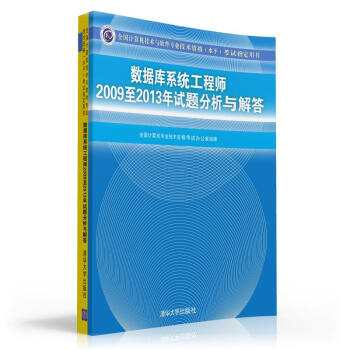

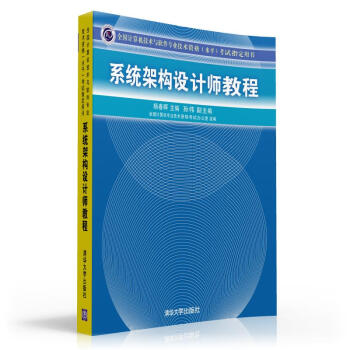

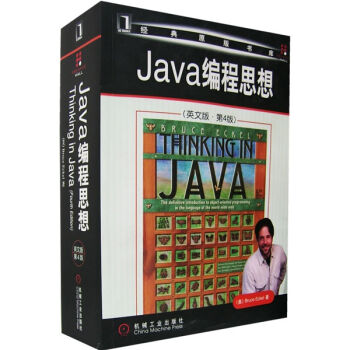

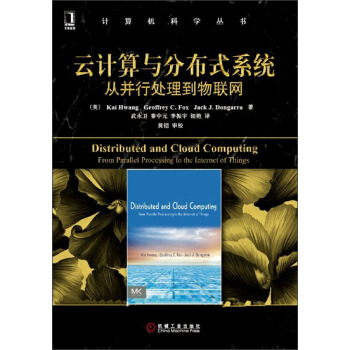
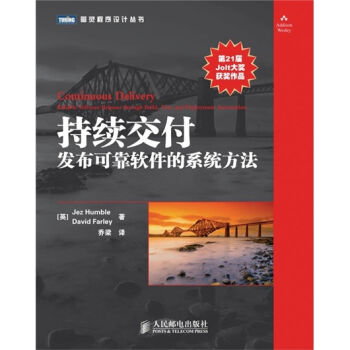
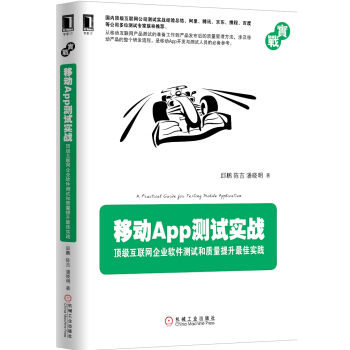
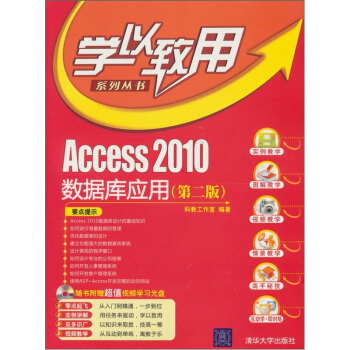

![恰如其分的軟件架構 [Just Enough Software Architecture] pdf epub mobi 電子書 下載](https://pic.windowsfront.com/11306502/rBEhU1IVZxEIAAAAABWxcwQm0P8AACTpQJLYTgAFbGL552.jpg)
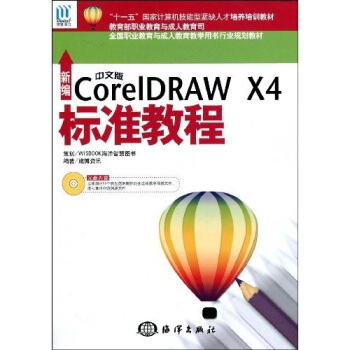

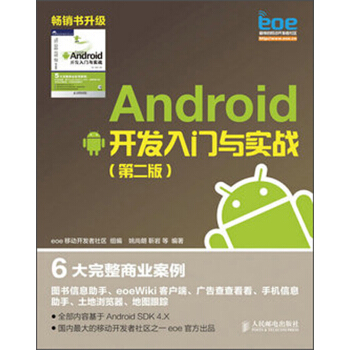
![移動開發經典叢書·Android C++高級編程 使用NDK [Pro Android C++with the NDK] pdf epub mobi 電子書 下載](https://pic.windowsfront.com/11390406/rBEhV1LXhvgIAAAAAAEPLS36TFUAAIFxADk20cAAQ9F613.jpg)
